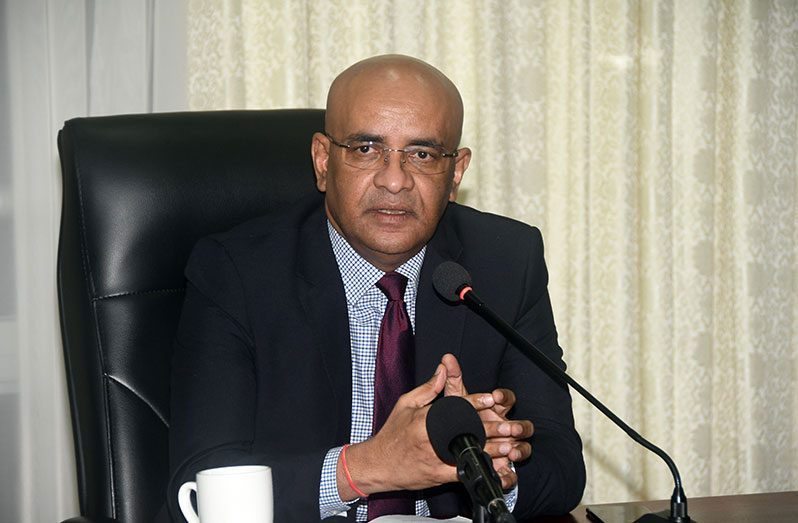–VP Jagdeo says
AS consideration continues about the possible establishment of a National Oil Company (NOC), the government is deliberating the option of passive ownership, where it owns shares in an exploration company but is not integrally involved in the exploration operations itself.
This was explained, on Monday, by the Vice President (VP), Dr. Bharrat Jagdeo, during a press conference held at the Office of the President.
The Vice President noted that the government had not yet determined whether there will be a NOC, but a continuous assessment of how that can be done was still being deliberated upon, given the various advantages and disadvantages of such a venture.
“The model that we are talking about should we go down this route is not an old-style NOC, but a more passive ownership of shares in companies in exchange for some of the offshore blocks that we have given,” Dr. Jagdeo noted.
He added: “We just simply say that we are getting a strategic partner and take a share of the company but not have control over operations or management except control given to shareholders. I’m just saying this for you to understand what the thinking in the government is at this time [but] no decision has been made. There are a lot of cons and a few pros.”
The Vice President stressed that the government’s main focus where it concerns the decision of establishing a NOC was about getting the most for the country out of the oil blocks.
“The only proof not a traditional style NOC, with more passive form of ownership, is whether we can get more revenue for the country. A modified Production Sharing Agreement (PSA) will give us a greater share of the revenue from oil and gas activity. Can we do that and get more for the country by virtue of ownership in shares of the company? Those are the variables being explored and once that is done the decision will be made,” Dr. Jagdeo said.
With several oil blocks remaining offshore Guyana, the option of Guyana keeping some of the blocks and establishing a NOC has been up for consideration for some time now, with growing interest.
Earlier this year, the VP noted that several “large operators” had submitted expressions of interest to partner with the government to establish a NOC. However, the government has been keeping an eye on the public discourse on the situation and has taken note of the various negatives and positives of the multiple models that could be used to establish an NOC.
With the setting up of a NOC owned and operated by the government was a highly capital-intensive venture, Dr. Jagdeo noted, that might not be in the country’s best interest at this time.
“From our own examination of the situation, we believe that having an old-style model National Oil Company at this stage could present major difficulties for the country. With net zero targets by 2050, it becomes harder to raise money globally for a National Oil Company,” the VP noted.
Net-zero refers to the balance between the amount of greenhouse gas produced and the amount removed from the atmosphere.
International scientists have reasoned that to prevent the worst climate damages, global net human-caused carbon dioxide emissions need to fall to net-zero by 2050. This is expected to be preceded by a slowdown in oil production going down to 2050.
With that being just 28 years away, this limits the number of years that Guyana has to maximise and get the most of its oil and gas sector at the soonest possible time.
Hence, the time it may take to set up a NOC would put too much of an unnecessary pause on Guyana’s exploration, which cannot be afforded at this point.
“If we were to vest all of the remaining assets in an NOC that could lead to too much concentration and slow down the process of exploration, which means a much slower process for proving our resources in an era when we have to accelerate the proving of these resources before the world totally decarbonises,” the Vice President reasoned.
The Vice President noted that the government welcomes conversations and debates about the establishment of the NOC in addition to other aspects of Guyana’s oil and gas sector and is keenly observing the valid points coming out of these discussions, notwithstanding some amount of mischief in some of the conversation.
“There has been quite a bit of debate surrounding this issue, and it’s good that we have that debate. In the debate we are getting a list of concerns that are universally known regarding national oil companies,” Dr. Jagdeo noted. “Questions about the time it takes to develop, about an overload on domestic capabilities and capacity, and the corruption associated with many NOCs around the world are not encouraging. More importantly, from our side, we’ve been adding some additional concerns about NOCs. Not the most obvious ones written about.”
He contiuned: “I dont mind people pointing out the negative because we have to address these issues when we make a decision. We are taking these issues seriously. But whilst we welcome that debate we’ve had a lot of crazy things being said.”





.jpg)








